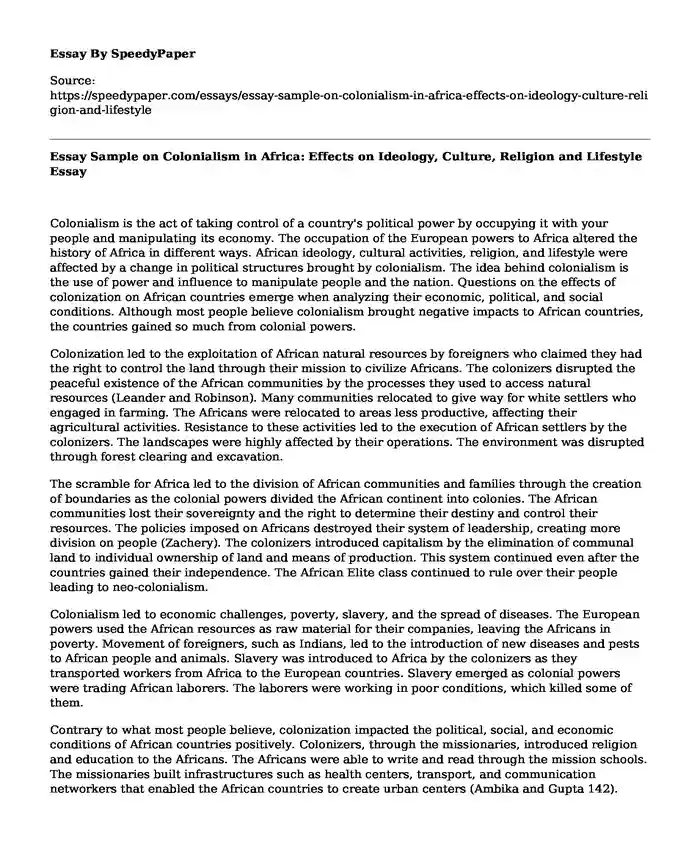
| Type of paper: | Essay |
| Categories: | Culture Political science Religion |
| Pages: | 3 |
| Wordcount: | 678 words |
Colonialism is the act of taking control of a country's political power by occupying it with your people and manipulating its economy. The occupation of the European powers to Africa altered the history of Africa in different ways. African ideology, cultural activities, religion, and lifestyle were affected by a change in political structures brought by colonialism. The idea behind colonialism is the use of power and influence to manipulate people and the nation. Questions on the effects of colonization on African countries emerge when analyzing their economic, political, and social conditions. Although most people believe colonialism brought negative impacts to African countries, the countries gained so much from colonial powers.
Colonization led to the exploitation of African natural resources by foreigners who claimed they had the right to control the land through their mission to civilize Africans. The colonizers disrupted the peaceful existence of the African communities by the processes they used to access natural resources (Leander and Robinson). Many communities relocated to give way for white settlers who engaged in farming. The Africans were relocated to areas less productive, affecting their agricultural activities. Resistance to these activities led to the execution of African settlers by the colonizers. The landscapes were highly affected by their operations. The environment was disrupted through forest clearing and excavation.
The scramble for Africa led to the division of African communities and families through the creation of boundaries as the colonial powers divided the African continent into colonies. The African communities lost their sovereignty and the right to determine their destiny and control their resources. The policies imposed on Africans destroyed their system of leadership, creating more division on people (Zachery). The colonizers introduced capitalism by the elimination of communal land to individual ownership of land and means of production. This system continued even after the countries gained their independence. The African Elite class continued to rule over their people leading to neo-colonialism.
Colonialism led to economic challenges, poverty, slavery, and the spread of diseases. The European powers used the African resources as raw material for their companies, leaving the Africans in poverty. Movement of foreigners, such as Indians, led to the introduction of new diseases and pests to African people and animals. Slavery was introduced to Africa by the colonizers as they transported workers from Africa to the European countries. Slavery emerged as colonial powers were trading African laborers. The laborers were working in poor conditions, which killed some of them.
Contrary to what most people believe, colonization impacted the political, social, and economic conditions of African countries positively. Colonizers, through the missionaries, introduced religion and education to the Africans. The Africans were able to write and read through the mission schools. The missionaries built infrastructures such as health centers, transport, and communication networkers that enabled the African countries to create urban centers (Ambika and Gupta 142). Africans were able to learn the technologies used by the colonizers to cultivate their land, which they later used to improve their farming capabilities. Colonization introduced the African continent into international trade. The benefits of trade activities are visible even in contemporary society. Without colonization, Africa would not have developed any political, social, economic, and cultural strategies it uses in the modern-day.
In conclusion, colonization had its negative influences on the African continent, but the continent relied on the colonizers to influence its ideologies, political systems, and economic activities. The impact the colonizers had on African people enabled the continent to be visible on the world map. Relations the continent enjoys with other regions developed due to the value the colonizers attributed to it. Colonization impacted African countries positively.
Work Cited
H., Leander, and J. Robinson. "Colonialism and development in Africa." The Oxford Handbook of the Politics of Development. 2013. https://voxeu.org/article/colonialism-and-development-africa Accessed 3 May 2020.
R., Zachery. "Negative Effects of Colonialism in Africa Cause and Effect Essay." Ivyland, 22 Mar. 2020, https://ivypanda.com/essays/negative-effects-of-african-colonization/ Accessed 3 May 2020.
S., Ambika, and T. Gupta. "The Making of Third World: The Impact of Colonization." Research Journal of English Language and Literature 3.2 (2015): 141-144. https://www.researchgate.net/profile/Tanu_Gupta3/publication/281497487_The_Making_Of_Third_World_The_Impact_Of_Colonization/links/55eb957d08ae65b6389dec9d.pdf Accessed 3 May 2020.
Cite this page
Essay Sample on Colonialism in Africa: Effects on Ideology, Culture, Religion and Lifestyle. (2023, Jun 29). Retrieved from https://speedypaper.com/essays/essay-sample-on-colonialism-in-africa-effects-on-ideology-culture-religion-and-lifestyle
Request Removal
If you are the original author of this essay and no longer wish to have it published on the SpeedyPaper website, please click below to request its removal:
- Ethnography Essay Example
- Free Essay on the Art of Negotiation and The Chicago Teacher Union Strike
- Free essay sample: The American Music
- Essay Example: Big Data and Social Media
- Acid/Base Extraction. Essay Example
- Free Essay Sample on Reflection on Proverbs and Ecclesiastes
- Free Paper Sample on Educational Policy
Popular categories




